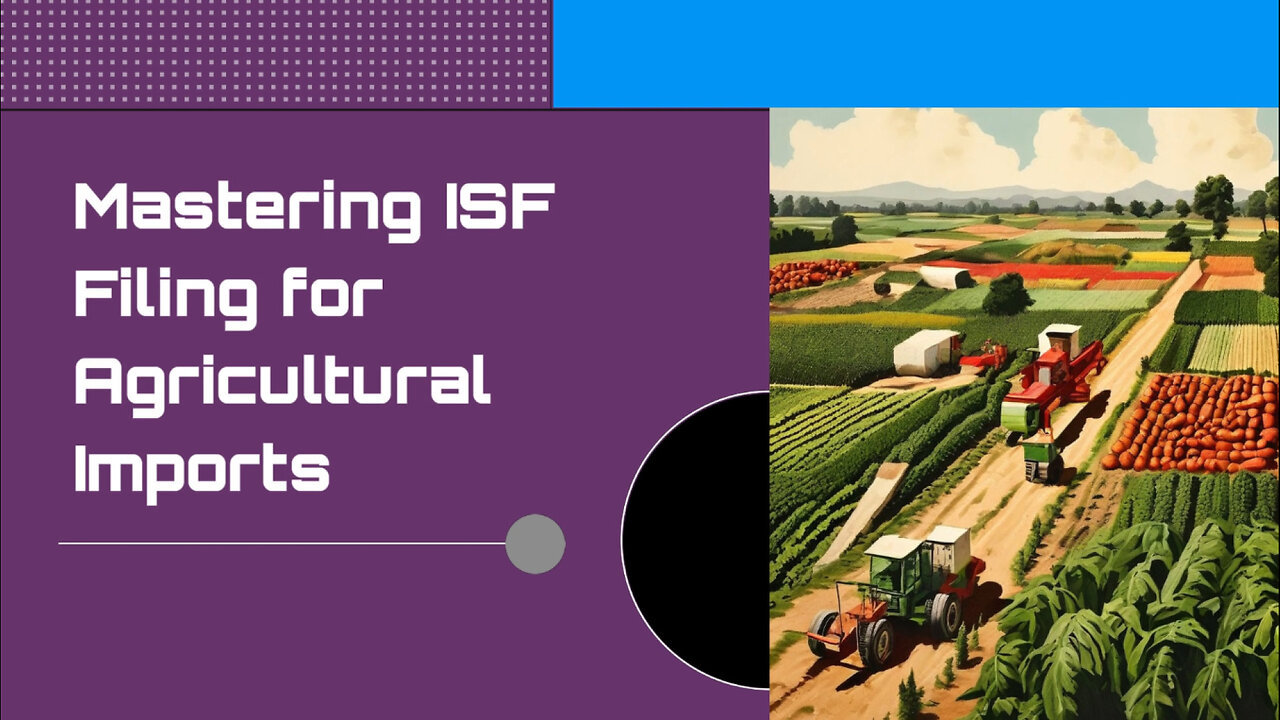Premium Only Content

Mastering ISF Filing for Agricultural Imports: A Must-Watch Guide!
ISF Checklist || 805-970-7918 || contact@isfchecklist.com || www.isfchecklist.com
Welcome to another episode of our customs brokerage series. In this episode, we will be delving into ISF filing for agricultural products and commodities. ISF, or Importer Security Filing, is a requirement implemented by the US Customs and Border Protection to enhance security measures for goods entering the country. The filing ensures that accurate and timely information about the cargo is provided prior to its arrival.
To begin, let's familiarize ourselves with the key elements of an ISF filing. The filing must be submitted at least 24 hours before the cargo is loaded onto the vessel bound for the United States. It encompasses essential information such as the seller, buyer, consignee, container stuffing location, and packaging type.
Given the complexity of customs clearance processes, many importers opt to work with customs brokers who specialize in ISF filings. These professionals navigate through the intricacies of the customs clearance process and ensure that all necessary information is accurately submitted to customs authorities. Additionally, they keep track of filing deadlines and ensure compliance with regulations.
When importing agricultural products and commodities, it is important to acquire a customs bond. A customs bond serves as a financial guarantee between the importer, the customs broker, and the US Customs and Border Protection. Its purpose is to ensure the payment of necessary duties, taxes, and fees, as well as compliance with all customs regulations.
Upon arrival in the United States, agricultural products and commodities are subject to various regulations and inspections. Customs officers conduct inspections to verify compliance with health and safety standards, as well as agricultural restrictions. To facilitate smooth clearance, it is essential to have all required permits, licenses, and certifications in place.
To avoid clearance delays, it is crucial to plan ahead and allocate sufficient time for inspections and any required testing or sampling of the agricultural products. Some commodities may have specific labeling or marking requirements that must be adhered to. Awareness of these regulations is essential to avoid any complications.
In conclusion, when importing agricultural products and commodities, understanding the ISF filing process and partnering with experienced customs brokers is vital. Ensure that your filing is accurate and timely, obtain a customs bond, and comply with all necessary regulations to guarantee a streamlined importation process.
Thank you for joining us in this episode, and we hope you found this information valuable. Stay tuned for more informative videos on international trade and customs practices. Don't forget to subscribe and hit the notification bell to be alerted about our upcoming videos. Until next time!
#usimportbond #isfcustomsbroker #uscustomsclearing #isfentry
Video Disclaimer Here: This video is purely educational and has no ties with the US government.
-
 2:11:25
2:11:25
vivafrei
11 hours agoEp. 275: Maxwell's Plea Deal Argument! Rogue Judges! Nuclear War? Trans Lawsuits! Crypto AND MORE!
67.8K151 -
 18:36
18:36
Forrest Galante
1 hour agoI Found The Ocean’s Most Venomous Snake and This Happened…
1.62K1 -
 LIVE
LIVE
SpartakusLIVE
3 hours agoSpartakus Sunday SOLOS to end your weekend with UNCONTROLLABLE HYPE
579 watching -
 LIVE
LIVE
Due Dissidence
9 hours agoTucker and Fuentes TRADE BLOWS in MAGA Civil War, Burr TRIGGERS Shapiro, Huckabee Visits GHF Site
1,372 watching -
 LIVE
LIVE
GritsGG
7 hours agoWin Streaking All Day! Most Wins 3230+ 🧠
808 watching -
 2:57:17
2:57:17
Barry Cunningham
1 day agoMUST SEE: 10 REASONS WHY IT'S TIME FOR PRESIDENT TRUMP TO DROP THE HAMMER! ( AND MORE NEWS)
63.3K84 -
 LIVE
LIVE
Mally_Mouse
4 hours agoSpicy *Sunday*!! - Let's Play!
135 watching -
 49:57
49:57
Sarah Westall
4 hours agoScience behind Social Revolutions, the Media, Beatles, Aliens and more w/ Mark Brake
26.8K6 -
 LIVE
LIVE
FusedAegisTV
21 hours agoOFFICIAL Evo 2025 Day 3 Co-Stream - Las Vegas, NV ∥ Top 8 FINALS! SF6, Tekken 8 & MORE
366 watching -
 1:09:08
1:09:08
Jeff Ahern
6 hours ago $5.91 earnedThe Sunday show!
36.6K15